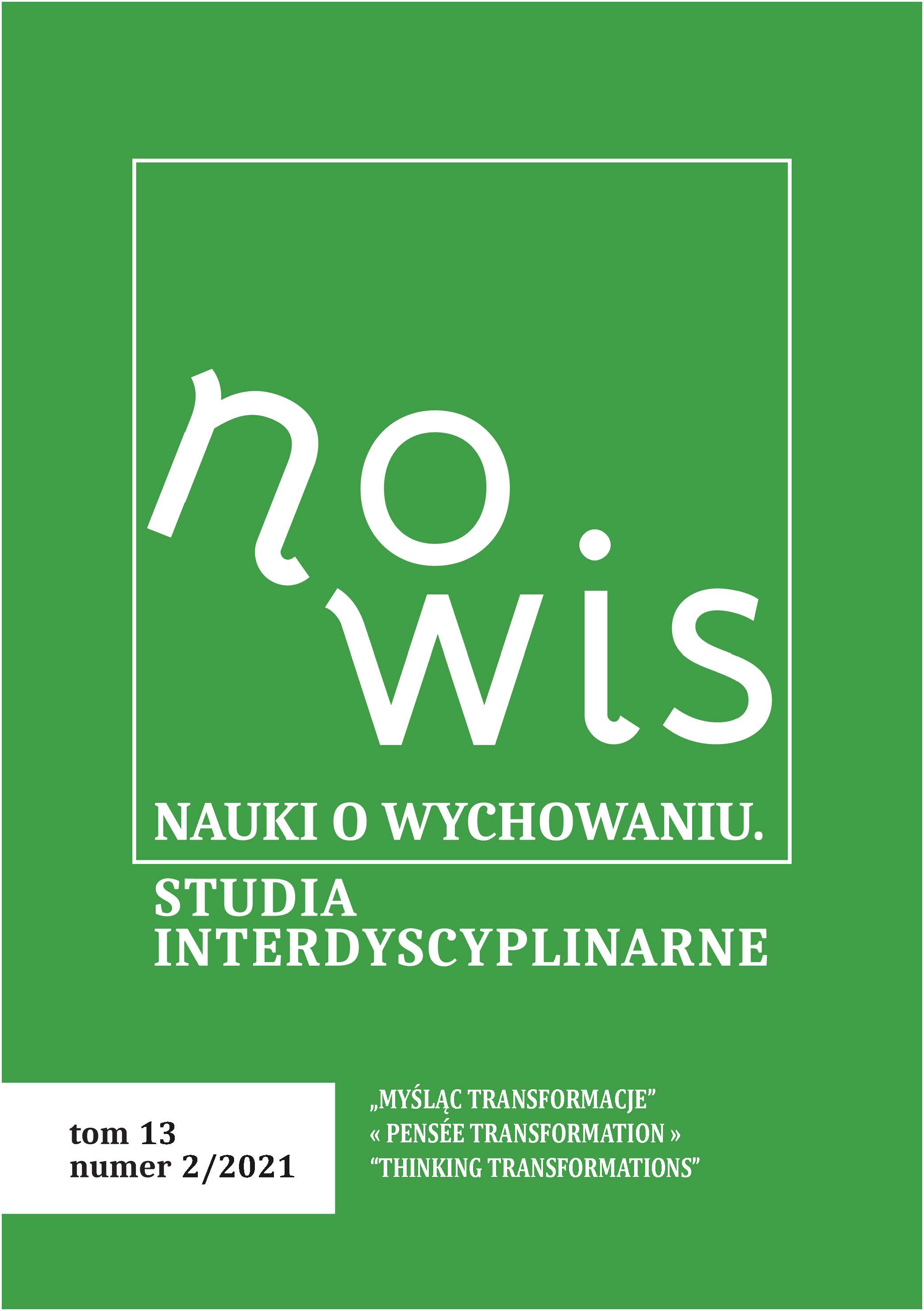Sens transformacji i transformacje sensu: zmiany sensu aktywności w wymiarze biograficznym
DOI:
https://doi.org/10.18778/2450-4491.13.11Słowa kluczowe:
construction de sens, dirigeants, événements marquants, activité professionnelle, formationAbstrakt
W artykule omawiany jest proces transformacji sensu aktywności profesjonalnej odczuwanego przez osoby kierujące przedsiębiorstwami z obszaru ekonomii społecznej (towarzystwa ubezpieczeniowe, stowarzyszenia, spółdzielnie, fundacje). Dokonano w nim rozpoznania elementów strukturyzujących te transformacje, powstałe w efekcie zdarzeń znaczących. Transformacje sensu aktywności kierowania odnoszą się do procesu kształcenia związanego z przygotowaniem do zawodu (Rodriguez 2008). Proces transformacji uruchamiają doświadczenia jednostkowe/epizodyczne (Rogalski, Leplat 2011), które zidentyfikowaliśmy jako zdarzenia znaczące. Sens towarzyszący doświadczeniom aktywności profesjonalnej ujmowany jest tu jako proces i wypadkowa aktywności symbolizacyjnych, wyrażanych w narracji (Bruner 1991). Transformacje sensu są formułowane jako dynamiczne artykulacje pięciu elementów. Są nimi: wymiar temporalny, emocje; dostrzeżenie zmiany przez podmiot; sformułowanie zasad działania; przeplatanie wymiarów indywidualnych i zespołowych. Te elementy charakteryzują proces konstruowania i rekonstruowania sensu w perspektywie diachronicznej. Nasze analizy są oparte na wynikach badań jakościowych przeprowadzonych z trzynastoma kierownikami przedsiębiorstw, w formie wywiadów swobodnych. W rezultacie badań otrzymaliśmy 39 narracji odnoszących się to tych sytuacji w sferze zawodowej, w których narratorzy mieli poczucie zderzenia z sytuacją zupełnie nową i nieoczekiwaną. Kierujący przedsiębiorstwami z obszaru ekonomii społecznej są szczególnie uprzywilejowani do analizowania transformacji sensu podejmowanej aktywności, ponieważ ich działania należą do ruchu idei i inicjatyw ekonomicznych o silnym zabarwieniu wartościującym, które je tworzą (solidarność, odpowiedzialność, zaangażowanie...). Co zmusza ich do podwójnego postępowania: ułatwianie aktywności współpracownikom poprzez wskazywanie im kierunku działania oraz wpisywanie sensu i ich działań w idee tego ruchu.
Bibliografia
Adam J.-M., Revaz F. (1996) L’analyse des récits, Paris, Seuil.
Google Scholar
Association pour l’emploi des cadres (2012) Les cadres de l’économie sociale et solidaire, Paris, Apec.
Google Scholar
Barbier J.-M. (2017) Vocabulaire d'analyse des activités. Penser les conceptualisations ordinaires, Paris, Presses Universitaires de France.
Google Scholar
Barbier J.-M. (2020) Sémantique de l’action et sémantique d’intelligibilité des actions. Le cas de la formation in : Manières de penser et manières d’agir en éducation et en formation, B. Maggi (dir.), Paris, Presses Universitaires de France : 89–104, https://doi.org/10.3917/puf.maggi.2000.01.0089
Google Scholar
DOI: https://doi.org/10.3917/puf.maggi.2000.01.0089
Barbier J.-M., Chauvigné C., Vitali M.-L. (2011) Diriger : un travail, Paris, L’Harmattan.
Google Scholar
Betton E., Cros F., Rodriguez D., Thiévenaz J. (2008) L’activité dirigeants de l’économie sociale, Paris, Cnam, MRPP.
Google Scholar
Bruner J. S. (1990) Acts of meaning, London, Harcard University Press.
Google Scholar
Bruner J. (1991) The narrative construction of reality, « Critical Inquiry », n° 18–1 : 1–21, https://www.journals.uchicago.edu/doi/abs/10.1086/448619, https://doi.org/10.1086/448619
Google Scholar
DOI: https://doi.org/10.1086/448619
Clot Y. (2004) Travail et sens du travail in : Ergonomie, P. Falzon (éd.), Paris, Presses Universitaires de France : 317–331, https://doi.org/10.3917/puf.falzo.2004.01.0317
Google Scholar
DOI: https://doi.org/10.3917/puf.falzo.2004.01.0317
Crossley M. L. (2000) Introducing Narrative Psychology. Self, trauma and the construction of meaning, Buckingham, Open University Press.
Google Scholar
Demoustier D. (2001) L’économie sociale et solidaire. S’associer pour entreprendre autrement, Paris, La découverte.
Google Scholar
Dewey J. (1993) Logique. La théorie de l’enquête, Paris, Presses Universitaires de France.
Google Scholar
Draperi J.-F. (2009) L’année de l’économie sociale et solidaire 2010 : une alternative à rédecouvrir en temps de crise, Paris, Dunod, https://doi.org/10.3917/dunod.drap.2011.01
Google Scholar
DOI: https://doi.org/10.3917/dunod.drap.2011.01
Gendlin E. (1962) Experiencing and the creation of meaning, New York, The free press of Glencoe, https://doi.org/10.1037/t29376-000
Google Scholar
DOI: https://doi.org/10.1037/t29376-000
Jeantet T. (2004) L’économie sociale en perspective. Rester fidèle aux principes, « Informations Sociales », n° 116 : 58–70.
Google Scholar
Labov W. (1993) Le parler ordinaire. La langue dans les ghettos noirs des Etats-Unis, trad. A. Kihm, Paris, Minuit.
Google Scholar
Labov W. (2003) Uncovering event structure of narrative in : Georgetown University Rownd Table on Languages and Linguistics. Linguistics, Language and the Real World: Discourse and Beyond, D. Tannen, J. Alatis (éds.), Georgetown, Georgetown University Press: 63–83.
Google Scholar
Labov W. (2010) Oral narratives of personal experiences in : Cambridge Encyclopedia of the Language Sciences, Cambridge, P. Hogan (éd.), Cambridge University Press: 546–548.
Google Scholar
Leclerc-Olive M. (1997) Le dire de l’événement (biographique), Paris, Presses Universitaires Septentrion.
Google Scholar
Leplat J., Hoc J.-M. (1983) Tâche et activité dans l’analyse psychologique des situations, « Cahiers de Psychologie Cognitive », n° 3 : 49–63.
Google Scholar
Mintzberg H. (1984) Le manager au quotidien. Les dix rôles du cadre, trad. P. Romelaer Paris, Les éditions d’organisation.
Google Scholar
Mintzberg H. (1990) The Manager’s job. Folklore and facts, « Harvard Business Review », n° mars-avril : 1–13, https://hbr.org/1990/03/the-managers-job-folklore-and-fact
Google Scholar
Mispelblom Beyer F. (2010) Diriger et encadrer l’économie sociale et solidaire : l’exception ou la règle ? in : Management humain des organisations. Grandeurs et misères de la fonction de dirigeant, F. Ben Hassel, B. Raveleau (dir.), Paris, L’Harmattan : 307–322.
Google Scholar
Nicolas S. (2005) Comment l’homme conserve-t-il des souvenirs ? in : L’homme cognitif, A. Weil-Barais, Paris, Presses Universitaires de France : 317–430.
Google Scholar
Robert V. (2007) L’irrésistible montée de l’économie sociale. Un projet, une culture, des valeurs, Paris, Autrement.
Google Scholar
Rodriguez D. (2017) Evènements marquants et (re)construction de sens des dirigeants de l’économie sociale, thèse de doctorat, Paris, Conservatoire national des arts et métiers.
Google Scholar
Rogalski J., Leplat J. (2011) L’expérience professionelle : expériences sédiméntées et expériences épisodiques, « Activités », 8 (2) : 4–31, https://doi.org/10.4000/activites.2556
Google Scholar
DOI: https://doi.org/10.4000/activites.2556
Sarbin T. R. (1986) Narrative Psychology : The storied nature of human conduct, New York, Praeger.
Google Scholar
Throne A., McLean K., Lawrence A. (2004) When remembering is not enough: reflecting on self-defining memories in late adolescence, « Journal of Personality », n° 72 : 513–542, https://doi.org/10.1111/j.0022-3506.2004.00271.x
Google Scholar
DOI: https://doi.org/10.1111/j.0022-3506.2004.00271.x
Tulving E. (1983) Elements of episodic memory, New York, Oxford University Press.
Google Scholar
Pobrania
Opublikowane
Jak cytować
Numer
Dział
Licencja

Utwór dostępny jest na licencji Creative Commons Uznanie autorstwa – Użycie niekomercyjne – Bez utworów zależnych 4.0 Międzynarodowe.





 Strona czasopisma, prowadzona przez Zespół redakcyjny NOWiS na platformie Index Copernicus:
Strona czasopisma, prowadzona przez Zespół redakcyjny NOWiS na platformie Index Copernicus: 





